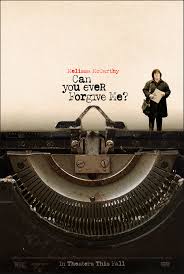Can You Ever Forgive Me?
Posted on October 25, 2018 at 5:23 pm
B| Lowest Recommended Age: | Mature High Schooler |
| MPAA Rating: | Rated R for language including some sexual references, and brief drug use |
| Profanity: | Pervasive strong language |
| Alcohol/ Drugs: | Alcohol and drug abuse |
| Violence/ Scariness: | Tense emotional confrontations |
| Diversity Issues: | None |
| Date Released to Theaters: | October 26, 2018 |
| Date Released to DVD: | February 18, 2019 |

And so, instead of immersing herself in the lives of those more talented and successful to write about them, she immersed herself in the lives of famous authors to write for them. After a chance opportunity to steal and sell a genuine piece of correspondence, she began to forge others. Collectors love to own signed letters from their favorite writers, and Lee Israel loved writing them and getting away with it. She even went out and bought vintage typewriters and mastered the art of duplicating their signatures. At last, she is a successful writer again!
Well, for a while.
The movie is uneven, sometimes sordid, as Lee and her only friend, Jack Hock (Richard E. Grant) go from genteel poverty to near-squalor. Uncomfortably, the movie seems to suggest near the end that all of this had some merit as a way for Israel to find her own voice. After she was caught and after her guilty plea, she wrote another book, the basis for this film, finally in her own voice, telling her own story.
The performances are what make the movie worth seeing. Every one of them is a gem. McCarthy and Grant show us the flickers of raw honesty from near-feral people who mostly cannot bring themselves to acknowledge how far they are from where they think they deserve to be. Dolly Wells, as the trusting soul who purchases some forged letters, Jane Curtain as Israel’s businesslike but not unkind agent, and Anna Devere Smith in a knockout of a scene as Israel’s ex are all thoughtful, nuanced, committed, and compelling.
In Israel’s forged Dorothy Parker letter, “Can you ever forgive me?” is coy, self-consciously self-mocking, but mocking the recipient, too. That is the voice of Israel, too, and even an actor as irresistible as McCarthy cannot make us feel sympathetic for her.
Parents should know that this film includes pervasive very strong language, sexual references and non-explicit situations, drinking and alcoholism, drugs, and criminal activity including fraud and theft.
Family discussion: Why was Lee proud of the letters she forged? Why was it hard for her to get along with people? What do we learn from Elaine?
If you like this, try: Lee Israel’s books and “84 Charing Cross Road”
